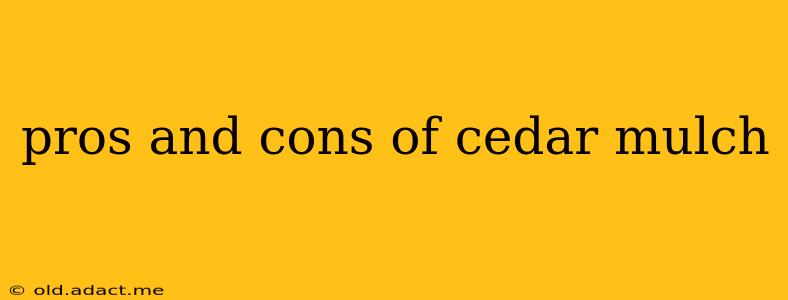Cedar mulch is a popular choice for landscaping, offering a visually appealing and fragrant addition to gardens and yards. However, like any landscaping material, it has its advantages and disadvantages. This comprehensive guide will delve into the pros and cons of cedar mulch, helping you decide if it's the right choice for your needs.
The Alluring Advantages of Cedar Mulch
Cedar mulch boasts several benefits that make it a favorite among homeowners and landscaping professionals.
1. Natural Insect Repellent:
One of the most significant advantages of cedar mulch is its natural insect-repelling properties. The aromatic oils present in cedarwood act as a deterrent to various insects, including termites, ants, and some beetles. This can help protect your plants and reduce the need for chemical insecticides. However, it's important to note that this isn't a foolproof solution, and heavy infestations may still require professional intervention.
2. Aesthetic Appeal and Pleasant Aroma:
Cedar mulch offers a rich, reddish-brown hue that enhances the visual appeal of any landscape. Its distinctive, pleasant aroma adds a sensory dimension, creating a more inviting outdoor space. The scent, while initially strong, typically fades over time.
3. Weed Suppression:
A thick layer of cedar mulch can effectively suppress weed growth by blocking sunlight and preventing weed seeds from germinating. This reduces the time and effort spent on weeding, making garden maintenance more manageable. However, some persistent weeds can still find their way through.
4. Soil Improvement:
As cedar mulch decomposes, it gradually enriches the soil with organic matter, improving its structure, drainage, and water retention capacity. This contributes to healthier plant growth and reduces the need for frequent watering. The decomposition process is relatively slow, providing long-lasting benefits.
The Potential Drawbacks of Cedar Mulch
While cedar mulch offers numerous advantages, it's crucial to be aware of its potential drawbacks:
5. Cost:
Cedar mulch is generally more expensive than other types of mulch, such as pine bark or hardwood mulch. This higher cost can be a significant factor for larger landscaping projects.
6. Strong Scent (for some):
While many find the cedar aroma pleasant, some individuals may find it overpowering or even irritating. This is a subjective factor, and it's essential to consider personal preferences before choosing cedar mulch. The scent will lessen over time as the mulch weathers.
7. Potential for Tannin Leaching:
Cedar mulch contains tannins, which can leach into the soil and temporarily lower the soil's pH, making it more acidic. This can be detrimental to certain plants that prefer alkaline soil conditions. Regular soil testing is recommended to monitor pH levels.
8. Fire Hazard (in dry climates):
Because cedar is a relatively flammable material, it's crucial to exercise caution when using cedar mulch, especially in dry or windy areas prone to wildfires. Maintaining adequate spacing between mulch and structures is vital.
Frequently Asked Questions (FAQs) about Cedar Mulch
Here are some common questions about cedar mulch that we will answer:
How long does cedar mulch last?
Cedar mulch generally lasts for 1-2 years, depending on the climate, thickness of application, and amount of sunlight exposure. The decomposition process is slower compared to some other mulches, so it provides longer-lasting benefits.
Is cedar mulch good for vegetable gardens?
Cedar mulch can be beneficial for vegetable gardens due to its weed-suppressing properties and slow decomposition rate. However, the strong scent may repel some pollinators, and the initial acidification of the soil needs to be considered. Monitor your soil's pH levels.
How much cedar mulch do I need?
The amount of cedar mulch you need depends on the area you want to cover and the desired depth. A general guideline is to apply a layer 2-4 inches thick. Consult online calculators or your local landscaping supplier for accurate estimates.
Is cedar mulch safe for pets?
While cedar mulch is generally considered safe for pets, it's crucial to ensure they don't ingest large quantities of it. If you have concerns, consider using a different type of mulch.
By carefully weighing the pros and cons of cedar mulch, you can make an informed decision about whether it's the right choice for your landscape. Remember to consider factors like your budget, soil type, climate, and personal preferences.
